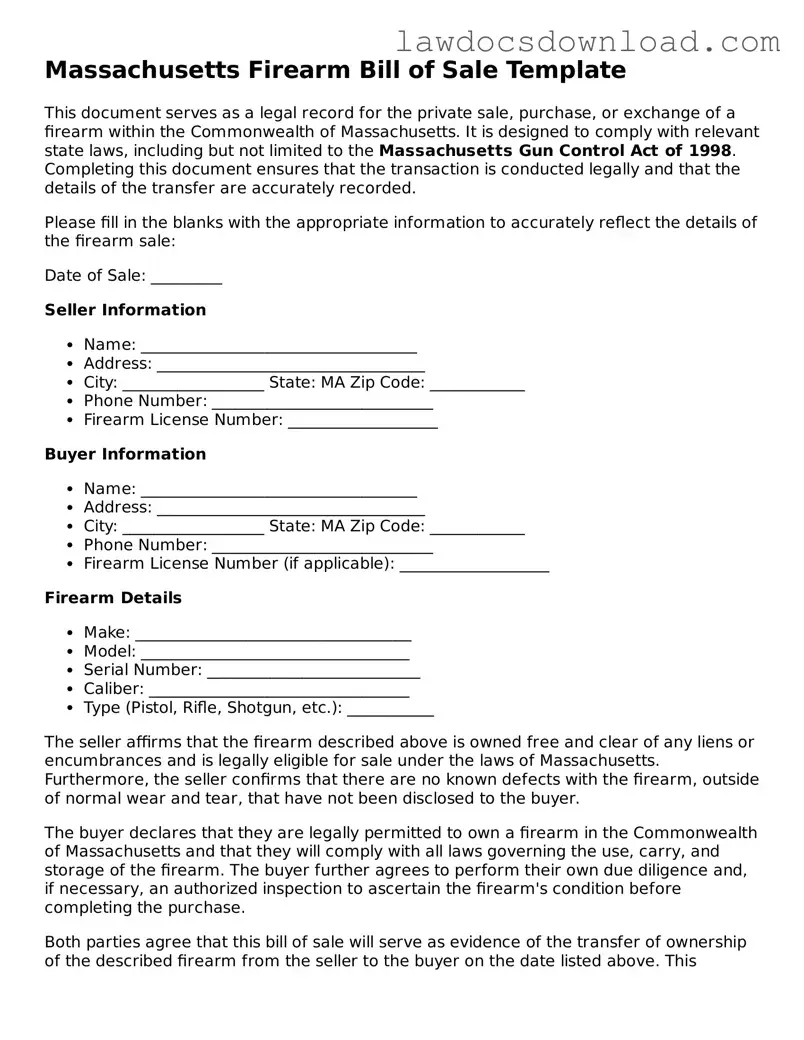The Massachusetts Firearm Bill of Sale form shares similarities with the Vehicle Bill of Sale. Both documents serve as proof of a transaction between a buyer and a seller. However, while one pertains to the transfer of ownership of a firearm, the other deals with vehicles. They both contain important details such as the date of sale, purchase price, and identifying information about the item sold and the parties involved.
Similar to the Firearm Bill of Sale is the Boat Bill of Sale form. This document also serves as a legal record of a sale, specifically for boats. It includes specifics about the boat, such as the make, model, and year, comparable to how firearms are identified by their make, model, and serial number in their respective bill of sale. Both forms provide legal protection and proof of ownership for the buyer.
The Equipment Bill of Sale is another document similar to the Firearm Bill of Sale. It is used to document the sale and transfer of ownership of equipment, from heavy machinery to office supplies. Like the firearm bill of sale, it includes specific details about the equipment sold, such as its condition and any warranties, ensuring that both parties are clear about the terms of the sale.
Like the Firearm Bill of Sale, the General Bill of Sale is used for transactions where one party sells an item to another. However, the General Bill of Sale is broader and not limited to any specific type of item. Both documents function as legal records that detail the transaction, including information about the buyer, seller, and the item sold, providing clear evidence of the transfer of ownership.
The Real Estate Bill of Sale shares the basic premise of the Firearm Bill of Sale, in that it documents the sale of property. However, it deals with real estate transactions. Both documents contain critical details of the sale, such as the purchase price and a description of the property sold, whether it's land or a firearm, and identify the terms agreed upon by the parties involved.
Closely related to the Firearm Bill of Sale is the Pet Bill of Sale. This document records the sale of pets or animals from a seller to a buyer. It typically includes information on the breed, age, and health of the pet, similar to how a firearm bill of sale would detail the make, model, and condition of the firearm. Both ensure the buyer is aware of what they are purchasing.
Another document similar to the Firearm Bill of Sale is the Business Bill of Sale, which documents the sale of a business or its assets. This bill of sale includes information about the business being sold, the buyer and the seller, and the terms of the sale, providing a record of the transaction and transfer of ownership, akin to the function of a firearm bill of sale in personal property transactions.
The Artwork Bill of Sale, while more specific, is akin to the Firearm Bill of Sale in that it records the sale of a piece of art. Just as a firearm bill details the specifics of the firearm, an artwork bill of sale includes detailed descriptions of the artwork, including the artist, title, and medium, to provide clear evidence of the transfer of ownership.
Similarly, the Antiques Bill of Sale is related to the Firearm Bill of Sale, as it is used to document the sale and transfer of ownership of antiques. It contains specific information about the antique item sold, including its age, origin, and condition, mirroring the way a firearm bill of sale would describe a firearm, ensuring both buyer and seller agree on the item’s value and state.
Lastly, the Livestock Bill of Sale bears resemblance to the Firearm Bill of Sale. It is designed to document the sale of animals such as cattle, horses, and other farm animals, listing details such as breed, health status, and price. Similar to the firearm bill of sale, it functions to protect the buyer and seller legally and ensures that the terms of the sale are clearly understood by both parties.

